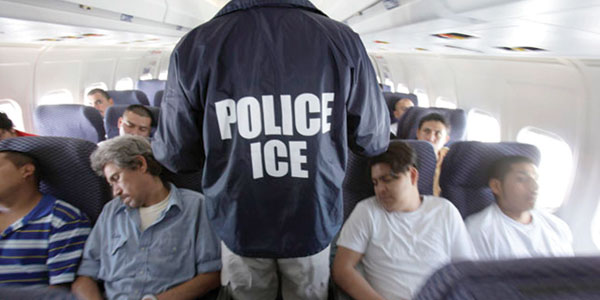
No sé cómo llegamos a este punto. En lugar de estar hablando del poder de los latinos en las próximas elecciones y sobre cómo implementar una reforma migratoria en Estados Unidos, estamos hablando de deportaciones.
Algo salió mal.
Algo está muy mal cuando, de pronto, el candidato Republicano que va adelante en las encuestas, Donald Trump, tiene algo en común con el presidente Barack Obama: las deportaciones. Uno, Trump, está pidiendo más deportaciones mientras otro, Obama, las ordena. (De hecho Trump, en un tuit, se adjudicó el crédito y dijo que las deportaciones planeadas por Obama se debían a la presión que él, Trump, había ejercido.)
Si el objetivo de las redadas ordenadas a principio de año por el gobierno de Estados Unidos era crear miedo, lo lograron. Padres y madres salen de sus casas por la mañana en Los Ángeles, Atlanta y Nueva York sin saber si verán a sus hijos en la noche. Muchos inmigrantes no quieren subirse al Metrorailen Miamiporque temen que los agentes de inmigración se suban a los trenes. Y organizaciones pro-inmigrantes dan información por el internet y en español con instrucciones sobre qué hacer si “la migra” toca la puerta en la madrugada. (Manténgase en absoluto silencio, recomiendan, no abra la puerta sin una orden judicial, y no firme nada.)
Hasta el momento han detenido a 122 personas con órdenes de deportación. Y faltan muchos más. Son, en su mayoría, familias que vinieron huyendo de la narcoviolencia y las pandillas en El Salvador, Honduras y Guatemala. Y sí, hay niños entre los detenidos. ¿No bastan los más de 2 millones de deportados en siete años? Si el número de indocumentados ha disminuido, ¿cuál es la urgencia de deportar gente sin un pasado delictivo?
La Casa Blanca dice que se siguen fielmente las prioridades de deportación establecidas en un memorándum por el Secretario de Seguridad Nacional, Jeh Johnson. Lo leí. Es cierto, la tercera prioridad es expulsar a gente que recibió órdenes de deportación después del primero de enero del 2014. Pero ese es precisamente el problema. La prioridad debe ser deportar terroristas y criminales, no a niños y a sus madres.
La verdad duele. Los están deportando para enviar un mensaje claro a los centroamericanos que piensan venir a Estados Unidos: No vengan y, si vienen, los vamos a deportar.
El problema es que mucha de la gente que están deportando puede ser asesinada o violada a su regreso. El diario británico, The Guardian, reportó que más de 80 centroamericanos fueron asesinados en los últimos dos años luego de ser deportados de Estados Unidos. Y conozco a un padre hondureño que sacó a su hija del país porque el viejo líder de una mara quería tener relaciones con la menor de edad.
En el fondo, no hay ninguna diferencia entre los refugiados centroamericanos que quiere deportar el gobierno de Obama y los 10 mil refugiados sirios que quieren recibir. Los dos grupos están huyendo de la violencia. Pero, arbitrariamente, unos son expulsados y otros son bienvenidos.
El problema está creciendo en el mundo. Naciones Unidos reportó que en el 2015 había 20 millones de refugiados (es decir, personas que huyen de la violencia política). Les corresponde a los países más ricos y generosos, como Estados Unidos y Alemania, salir en su ayuda. Pero eso no ha significado un alto total a las deportaciones de los refugiados.
Hay, desde luego, una enorme diferencia entre lo que está haciendo el gobierno de Obama y lo que propone Trump. El actual gobierno quiere deportar a los 100 mil centroamericanos que llegaron a Estados Unidos desde enero del 2014, según reportó originalmente The Washington Post, mientras que Trump quiere sacar del país a los 11 millones de indocumentados si llega a la presidencia. Pero, a final de cuentas, ambas cosas causan pánico. ¿Hay acaso algo más brutal y doloroso que separar a un niño de sus padres?
No sé cómo llegamos aquí. En lugar de apelar a lo mejor de Estados Unidos, el debate migratorio en el país parece haber sido secuestrado por los intolerantes. Deportar a los más débiles no es una estrategia necesaria; es una simple decisión con consecuencias políticas.
Lo único que me consuela es que, conforme se acerque el día de las elecciones en noviembre, muchos vendrán a suplicar por el apoyo de 26 millones de latinos elegibles para votar. Ese día nos acordaremos de quienes estuvieron con nosotros cuando más los necesitábamos y las cosas, espero, empezarán a cambiar.
Deporting the Most Vulnerable
I don’t know exactly how we got here, but rather than discussing the influence that Hispanic voters can wield in the upcoming presidential election or how lawmakers can pass commonsense immigration legislation, we’re back to focusing on deportations in America.
Something, obviously, has gone very wrong.
As evidence, take the fact that Donald Trump, the front-runner for the Republican nomination for the presidency, has something in common with President Obama: Trump is constantly calling for more undocumented immigrants to be deported, while the Obama administration is actually increasing deportations with new raids. (Trump even took credit earlier this month, tweeting that pressure from him is the reason that Obama is going through with the new raids.)
If the goal of the immigration raids is to create fear, mission accomplished. These days, mothers and fathers in cities like Los Angeles, Atlanta and New York are heading to work in the morning, not knowing if they will return or see their children later. In Miami, where I live, many immigrants are avoiding the Metrorail, afraid that immigration agents will board the trains and question passengers. Meanwhile, advocacy groups are busy disseminating information in Spanish about what to do if families hear the dreaded knock from immigration agents at their door. (Keep silent and don’t open the door unless they have a warrant, activists recommend.)
Since the raids started in early January, more than 100 immigrants have been detained. And there will be more. The detainees are mostly people who fled drug-related violence and gangs in El Salvador, Honduras and Guatemala, and, yes, there are children among them.
The White House has announced that agents are following deportation priorities outlined in a November 2014 memo by Jeh Johnson, the secretary of Homeland Security. According to the memo, the administration’s top priority is to deport individuals who are “threats to national security, border security and public safety,” followed by individuals who have committed crimes or had multiple immigration status violations. The third priority is to remove people who received deportation warrants after Jan. 1, 2014.
According to this memo, the focus of the administration’s efforts should be on removing terrorists and criminals from the country. Yet it is children and their parents who are being targeted. Clearly, the purpose of this month’s raids seems to be to send a message to any Central Americans who are considering trying to cross into the United States: Don’t come — and if you do, we will send you back.
Here’s the big problem, though: Many of the people who are being deported are at risk of being killed when they return to their home countries. Last October, The Guardian reported that since 2014, more than 80 Central Americans had been killed after being deported from the U.S. and returning to their home countries. And it’s impossible to know how many have been attacked after returning. I myself know a father from Honduras who got his young daughter out of the country because the leader of a criminal gang there wanted to have sex with the minor.
There simply is no difference between the Central American refugees who the Obama administration wants to deport and the 10,000 Syrian refugees it wants to take in. Both groups are fleeing violence, yet one is being targeted for removal, while the other is being welcomed.
Meanwhile, the problem of populations fleeing violence is growing around the world. The U.N. recently reported that in 2015, 20 million refugees fled political violence in their home countries. It’s up to the richest and most generous countries in the world, like the United States, to help solve this crisis. Unfortunately, that hasn’t meant halting the deportation of refugees.
Of course, there is a huge difference between what the Obama administration is doing and what Trump is proposing if elected president. The administration is targeting the 100,000 Central Americans who arrived in the U.S. since January 2014, according to reporting from The Washington Post, whereas Trump wants to completely eject 11 million undocumented immigrants from the country. But both plans have, understandably, instilled fear: Is there anything more terrifying than the thought of your child being taken away?
I don’t know how we got here. By now, we Americans should be figuring out how to solve our immigration problems intelligently and compassionately. Yet the entire debate seems to have been hijacked by bigots. Throwing your support behind the deportation of the most vulnerable people in our country is not a good strategy. In fact, that simple decision can have enduring political consequences.
Election Day is approaching, and soon candidates will come begging for the support of the 26 million Hispanics who are eligible to vote. When that happens, rest assured that we will remember which politicians were there for us and those who needed them most. And we won’t forget who was not.









